
Happy New GWB!
A few hours ago, the “GWB Digitisation Act”, reforming German competition law, passed the Bundestag. Thus, with a long lead time, the reform of German antitrust law has been set in motion, which may now become law very quickly. The focus of public interest is above all the strengthening of the Federal Cartel Office against big tech. Philipp Bongartz puts the latest developments into context.
With the votes of the Grand Coalition of CDU, CSU and SPD as well as the Greens, an impressive move was done by parliament against the business practices of online platforms. Hansjörg Durz of the party CSU spoke of the “birth of the social digital market economy” (those of you familiar with the German faith into social market economy know that his is a historic moment, then). It had already been announced that the improved government draft would contain some innovations – this has now proved to be an understatement. With a crash prophecy, a second chance and a belated Christmas present, the future competition law arrives in the new year.
As a service to our readers, we have prepared a consolidated version of the most important amended provisions of the new GWB (available here in German) and a first English translation (available here). Yes, the customer is still king, here!
About time
The amendment to the Cartel Act (Gesetz gegen Wettbewerbsbeschränkungen (GWB) in German), which became necessary due to the implementation of the ECNplus Directive, was considerably delayed. After it was first taken as a pawn by the Ministry of Justice, the long-awaited appearance in the Bundestag – announced for 17 December 2020 – was cancelled at short notice and postponed to today. Federal Minister of Economics Peter Altmaier (CDU) was severely criticised by Katharina Dröge of the Green party for the lengthy procedure during today’s debate in the Bundestag. To be fair, a lot of things happened in between and that changed the competition landscape since the first government draft of October 2020: Facebook filed a second emergency appeal against the Federal Cartel Office’s order, the Office initiated a second abuse procedure against Facebook and the European Commission presented its draft Digital Markets Act. But all in good time.
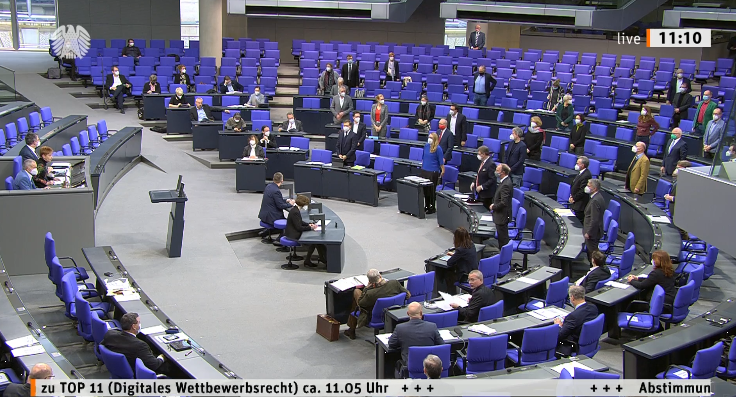
19a is the new 81
Even in the first draft bill, the core provision of the new GWB, Section 19a, was awaited with great excitement. After the fuss had died down somewhat, it soon became apparent that its previous wording was not felt to be effective enough (this was also the result of the expert hearing in November). After all, Andreas Mundt’s people are supposed to use it to get a grip on the “Wild West methods” in the digital sector (as Matthias Heider, CDU, put it).
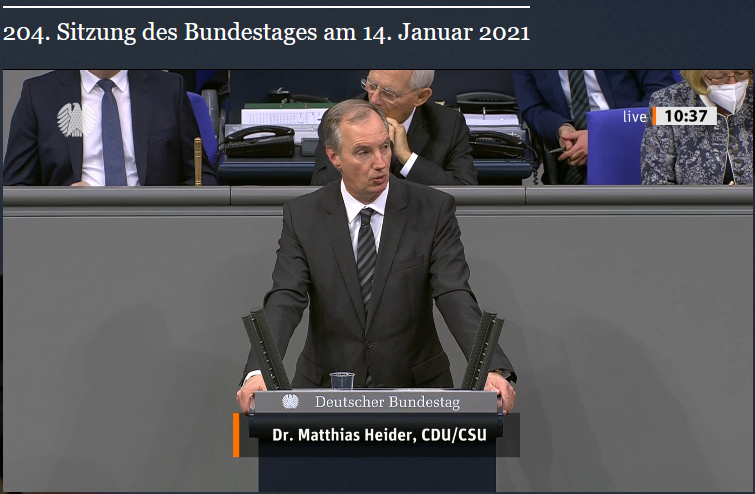
This is where the new version of Section 19a GWB comes into play: The list of five conclusive practices that the Cartel Office can prohibit by order for undertakings with paramount significance for competition across markets (UPSCAM) is extended to seven practices, illustrated with ten much more concrete examples. New (compared to the government draft) are the prohibitions,
- to take measures that hinder other companies in their business activities on procurement or sales markets, if the undertaking’s activities are important for access to these markets (No. 2), and
- to demand benefits for the treatment of another company’s offers that are disproportionate to the reason for the demand (No. 7).
The new No. 2 extends Section 19a to the constellation that companies are impeded with which the norm addressee has no competitive or intermediary relationship. Ecosystem providers should thus be prevented from abusively securing their market position against external threats. As an example, the pre-installation of an unspecified search engine in browsers, on mobile and desktop devices and voice assistants is mentioned in the explanatory memorandum to the law, as is the prohibition of companies from contacting customers beyond the specially provided access. Apple was discredited for this practice after Spotify and Kobo filed a complaint to the European Commission. Admittedly, in the proceedings that served as a model here, the impediment of competitors is at issue. However, constellations are conceivable in which this is not the case without the practices losing their potential to cause harm.
No. 7 is based on the prohibition of tapping (Section 19 (2) No. 5 GWB). The wording (“in no reasonable proportion”) indicates an evaluative overall consideration with high requirements. The decisive factor is above all the extent to which the required service (in particular the licensing of copyrights) is necessary for the provision the own services. The muses for this provision were, on the one hand, Google and, on the other hand, probably Amazon, which had its commercial customers grant it far-reaching rights of use to their product material (images, information).
It is also noteworthy how no. 4 on “misuse of data” has been reworded with great attention to detail. At the beginning of 2019, the Federal Cartel Office prohibited Facebook from requiring users to consent to the merging of their Facebook data with data collected by the network on third-party services belonging to the group (e.g. Instagram, Oculus). After the Federal Court (Bundesgerichtshof = BGH) let the injunction pass in summary proceedings, the conduct complained of was enshrined in the catalogue of Section 19a (2) (formerly No. 3). In the meantime, Facebook had announced that its Oculus devices would in future only be usable with a Facebook account. The Bundestag apparently had as much sympathy for this David Copperfield Ehrlich Brothers trick as the Federal Cartel Office and the Oculus users did. In its new wording, data abuse now no longer requires that the data be collected in a dominated market.

Speaking of Facebook…
After its application for an order of suspensive effect before the Higher Regional Court of Düsseldorf succeeded but failed in the final instance, Facebook had the idea of initiating a second summary proceeding. The Düsseldorf Higher Regional Court, which then dealt with the case again, issued a “suspended decision” in which it again ordered the suspensive effect and against which it did not allow an appeal on points of law. The Federal Court of Justice (Bundesgerichtshof, BGH) is currently reviewing the order in response to the Office’s complaint of non-admission. [PS on 15/1/2021: A commentator to this blog post states that Facebook withdrew its second application for an interim injunction at the end of December (see in the comments below). We heard that from a good source, too, but were not able to double-check it.]
Section 73 (5) GWB introduces a priority lane for Section 19a proceedings. According to this, the Federal Court of Justices decides in the first and last instance on all disputes in connection with Section 19a GWB “including all independently contestable procedural acts”. The judges can receive assistance in economic matters from the Monopolies Commission. The background to this is that structural damage to online markets often cannot be repaired after protracted court proceedings, according to Falko Mohrs (SPD).
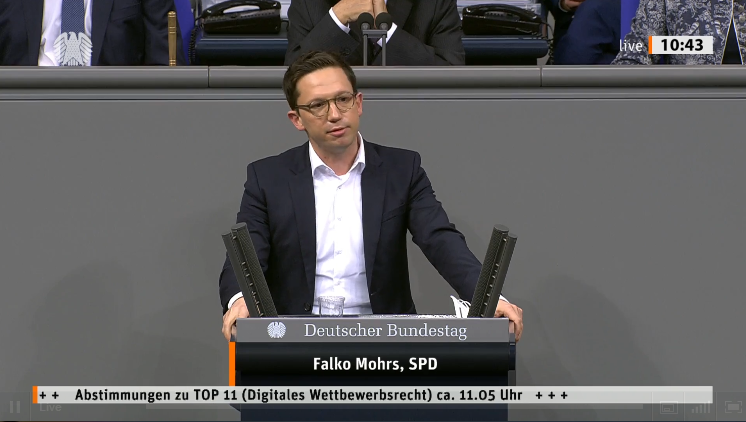
Enough of that
In mid-December, the European Commission published its proposal for a Digital Markets Act. It is intended to give the Commission two new powers: the ex ante regulation of more closely defined practices and market investigations (so-called Market Investigation Tools, which do not reach the dimension of the originally planned New Competition Tool). The norm addressees of the ex ante-regulation are platforms that have a gatekeeper function as providers of core platform services. Platform services are, for example, search engines, social networks, and operating systems.
Ex ante-regulation would mean that certain practices are prohibited per se, once a gatekeeper is designated as such. Other practices would require further specification. The list in Articles 5 and 6 of the DMA proposal includes self-preferential treatment, interoperability restrictions, communication bans and the merging of platform user data with that of third-party services. Déjà vu?
The elephant in the room
The broad intersection between the DMA and Section 19a of the new GWB raises the question of the relationship between the provisions.
The legal basis of the DMA is not Article 103 TFEU, which is intended for the implementation of Articles 101, 102 TFEU, but Article 114 TFEU and thus it constitutes internal market law, harmonising national rules. The Commission justifies this decision with the fact that different requirements of the Member States for platform services create regulatory fragmentation, which is further exacerbated by national legislative initiatives of some Member States. Due to the cross-border nature of these services, a regulatory patchwork would jeopardise the internal market for digital services and the functioning of digital markets as a whole. Therefore, harmonised regulation is needed throughout the EU (so they say).
In Article 1 and Recital 9 of the DMA, the Commission explains what it means by this. The DMA does not affect the provisions of European and national antitrust law, in principle. The member states remain free to apply to unilateral conduct national rules that require an individual assessment of the market position and the effect of the conduct and allow the assertion of efficiencies and objective justifications. However, they are excluded from applying such regulations whose specific subject matter is the platforms and services addressed in the DMA.
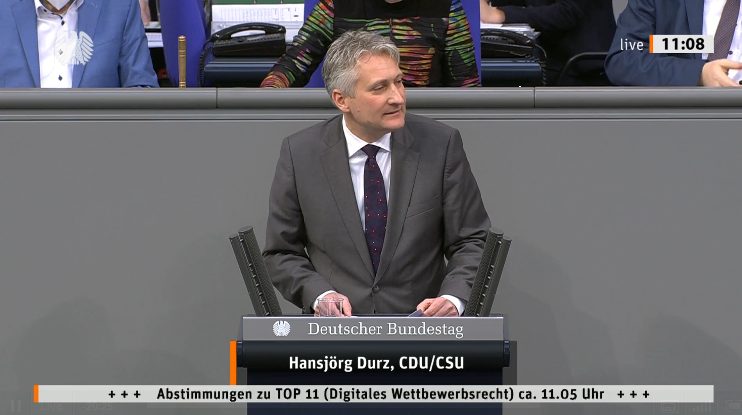
Hansjörg Durz (CSU) 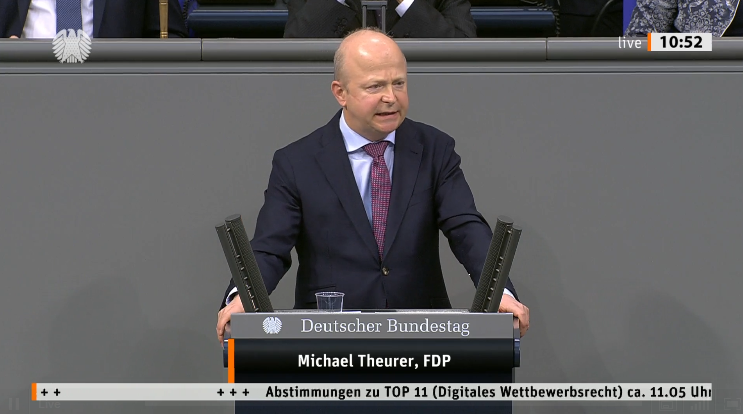
Michael Theurer (FDP) 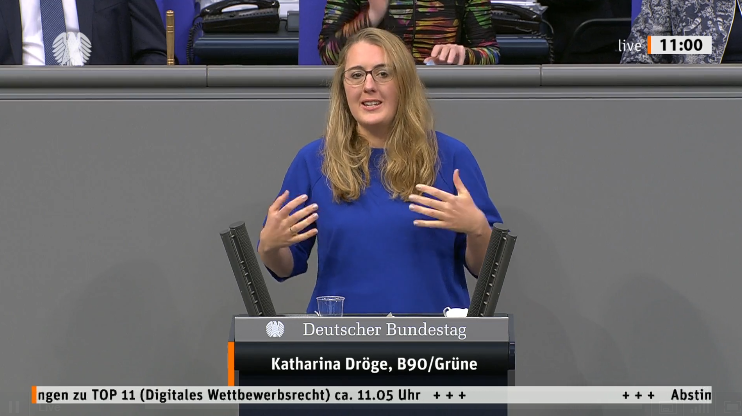
Katharina Dröge (Bündnis 90/Die Grünen)
So why are we still talking about Section 19a GWB?
First of all, it is anything but certain when and in what form the DMA will ultimately come into force. In a motion for a resolution accompanying the GWB decision, the German Bundestag called on the federal government to work with Brussels to ensure that the DMA will allow space for national enforcement and rules. One possibility for this would be an opening clause for the national regulation of the platform economy. Experience with different regulatory models would guarantee the determination of the best possible one, according to the reasoning. Whether § 19a will attain the significance it promises in the long term will therefore only become clear in the legislative process of the DMA. Until then, however, the GAFAs still have some opportunity to gain experiences with Section 19a GWB.
Facilitation in merger control
Even beyond Section 19a, the new version, in deviation from the government draft, has a few surprises in store. With regard to the thresholds for merger control (Section 35 (1) of the GWB), the legislator was very generous. The current domestic turnover thresholds of €25 million and €5 million, the second of which was initially to be raised to €10 million, will now be corrected to €50 million and €17.5 million. The rationale: Inflation. That was recently… well. Is this betting against the euro?
More realistically, there may be two motives behind this, as Falko Mohrs and Matthias Heider also mentioned in the Bundestag: to relieve the burden on SME as well as on cartel officials. In view of 1,200 merger notifications in 2020 and only 7 phase II-procedures, it makes perfect sense to spare the Bundeskartellamt some of the wink-and-nod procedures. In addition, Section 39a of the GWB adds a completely new element for merger control, the so-called Remondis clause, albeit with the necessity of conducting a sector enquiry beforehand.
Last Straw Ministerial Approval
There is also a surprise in the law on ministerial approval: Since the (probably correct) impression had arisen that the ministerial approval had developed into a “free shot” for prohibited mergers, the hurdles for its use were to be raised. To this end, the new section 42 (1a) GWB required an unsuccessful appeal to the Higher Regional Court of Düsseldorf. This proposal has now been quietly – almost secretly – dropped, without further explanation.
The background is possibly this: In contrast to the Ministry, the Appeals Court only reviews the assessment of the merger under competition law and not its overriding by overall economic benefits or interests of the general public. The complainants would therefore be forced to challenge the Cartel Office’s competitive assessment, even though they might not object to it at all, but want to assert its overriding by general interests instead.
Disappointed merger participants are thus left with a second chance – and we are with the prospect of continuing the debate on what constitutes a politically overall beneficial merger.
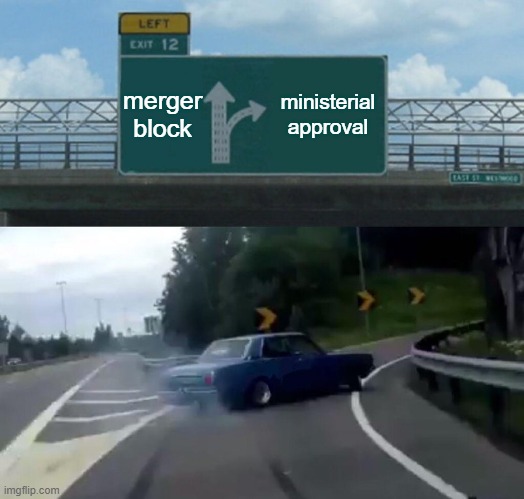
Isn’t Christmas over?
The amendment concludes with a gift for companies (and their solicitors): According to Section 81d (1) sentence 2 no. 4 GWB, “reasonable and effective precautions taken in advance to avoid and detect infringements” can be considered as mitigating circumstances in the future assessment of fines.
Before the carrier pigeons fly off with the law firm newsletters, hailing the new advantages of compliance programmes, however, a re-consideration should be allowed: The argument frequently put forward against the recognition of compliance measures, that the cartel infringement proves the lack of their effectiveness, has not escaped the attention of lawmakers. Therefore, as a rule, it considers the measures to be effective if they lead to the detection and reporting of the infringement. In this case, however, the uncovering company – the first applicant for leniency – under Section 81k GWB benefits from the reduction of the fine to zero, anyway.
There were no gifts for those who had written on their wish list more extensive powers for the Federal Cartel Office in consumer protection and rules against “killer acquisitions”. And it should also be said that all those who had demanded special rules for their sectors went away empty-handed. Apart from a regulation for hospital mergers in Section 186 (9) GWB and a minor change in merger control law for the media, the parliamentarians remained firm in the face of the various lobbyists. Phew!
What happens next?
With the passing of the law, the Bundestag is taking a pioneering role in the global efforts to regulate platforms. Techlash goes Germany. The Bundesrat, a federal committee that has to give its nod, already has the GWB on its agenda in a special session on Monday, 18 January 2021. If the Bundespräsident, the Federal President of Germany, is ready and the law is signed and promulgated quickly, the new GWB can probably come into force next week and apply immediately. However, this is not the last word on the 10th GWB amendment. We are now following with great interest what the Federal Cartel Office will do with its new powers, what repercussions the legislative process around the Digital Markets Act will have and how the quite sensational rules on data access will be handled by the courts. The tug-of-war between Brussels, Bonn, and Berlin over Section 19a, the centrepiece of the new GWB, may not only decide how #GWB10 goes down in history. More decisive is how and whether it will be possible to set a competitive regulatory framework for digital platforms.
Ass. jur. Philipp Bongartz is a research assistant at the Chair of Civil Law, German and European Competition Law at Heinrich Heine University Düsseldorf and a doctoral student of Prof. Podszun.
10 thoughts on “Happy New GWB!”
The second proceeding initiated by Facebook at the OLG Dusseldorf was already withdrawn at the end of last year, this isn’t reflected in this (well written) post, is it?
We heard rumours about this, too, yet we do not have an official confirmation. Thanks for pointing to this!
RP
Great summary! Also interesting: the (at first sight) minor amendment in sec 186 (4) GWB.